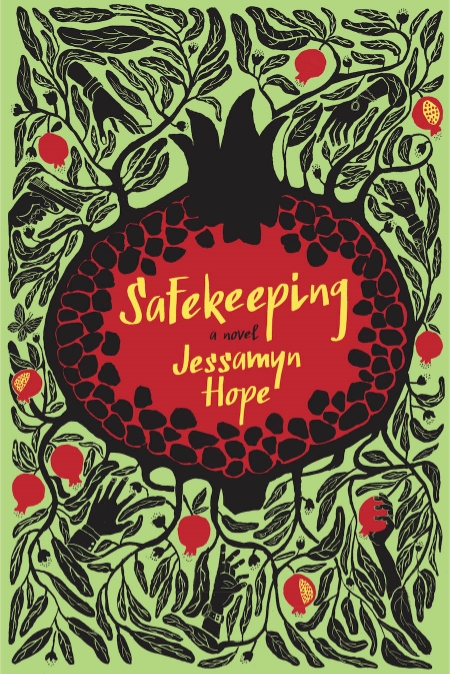
Jessamyn Hope
June 9th, 2015
Fig Tree Books
Safekeeping is a novel about personal tragedy, hope, and suffering within the backdrop of history. A medieval brooch is the connection of time and history. Although it flashbacks to Jewish history from the German Pogroms to the Holocaust and the founding of Israel, its main focus is the year 1994 in an Israeli Kibbutz where six people meet. These six are connected through a search for their identities, looking to escape their own personal crisis.
The main focus of the book is the theme of how someone perseveres after a tragedy. This is done through the backdrop of the Holocaust. As Hope stated, “People walked out of the death camps stripped of everything and everyone they had ever loved. They had all the reason in the world to give up on existence, to give up on humanity, but somehow found the hope and strength to start again, to fight for their own country.”
The reason the title Safekeeping, according to the author, “We are living in a time where individuals need to speak up. On some level there is a competition between looking out for yourself and taking a responsibility for the larger community. I called the book Safekeeping for a reason. Israel is supposed to be a place where everyone can be kept safe. Sadly project forward to today where there is still a search for safekeeping, especially as the world turns its back on Israel. Safekeeping is less and less guaranteed.”
By having a contrast of characters the author shows the reaction of individuals versus the responsibility of a community. Set in 1994 on a Kibbutz the story traces how the six characters search for what is important. Among the characters are Ziva, a Zionistic socialist; Franz, a Holocaust survivor; Ulya, a Soviet émigré; Adam, Franz’s grandson who has become an addict; and Claudette, someone trying to overcome OCD.
Franz is an individualist who lives day to day, while Ziva, a Kibbutzim pioneer, has a higher ideal, with a strength and energy to start up a new country. An important scene in the book contrasts these two when Ziva wants Franz to change his name to a Hebrew one. A powerful quote reflects this, “All I’m saying is that the Nazis tried their damnedest to do away with Franz, and if it’s quite all right with you, I’d prefer to not lend them a helping hand.”
Hope noted, “In building Israel Jews were asked on some level to reinvent themselves. Franz had no Hebrew identity and wanted to hold on to his old identity, while Ziva, by extension, Israel, is asking him to give it up. She represented those who founded Israel by turning away from their past, reinventing themselves.”
The other characters, although not as much as a sharp contrast are Ziva and Ulya. Both are ambitious; yet use it for different reasons. Ziva has certain goals, the cause of establishing the State of Israel, while Ulya is out for herself.
The author explained, “I wrote the Russian immigrant character and Ziva as Scarlett O’Hara types. I was inspired by Scarlett and fascinated by Gone With The Wind. I wanted to write that type of character. All are not morally admirable, extremely ambitious, yet you can’t help but be inspired by their grit and determination. They use any tool to survive.”
The brooch also symbolizes history with the fears and desires getting passed down. These brooch stories show how events from the past, some of which are unknown, affect, how someone turns out. The brooch chapters were a way to show readers that they are influenced by what happened to their family through past generations. Every single character in the book has a personal challenge, usually that was inherited.
Safekeeping has a very riveting story that includes romance, betrayal, and tragedy. Anyone that has tried to persevere will find this book a must read.
Elise Cooper




